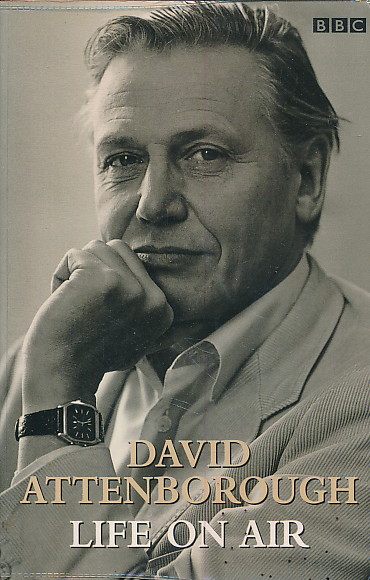Life on Air: Memoirs of a Broadcaster
€6,00
Nema na zalihi
| Težina | 459 g |
|---|---|
| Format | 13 × 20 cm |
| Autor | |
| Izdavač | |
| Mjesto izdanja | London |
| Godina | 2003 |
| Broj stranica | 384 |
| Uvez | Meki |
| Stanje knjige | Vrlo dobro |
David Attenborough hardly needs any introduction; his voice has accompanied so many of the best natural history programs that have graced our televisions over several decades. Life On Air , his autobiography, tells the story of how he has managed to professionalise his schoolboy interests in such a remarkably successful way. Attenborough’s Life On Air began in 1950, having taken a degree in Natural Sciences in the University of Cambridge, done National Service in the Navy, got married, done a year as an editor with an educational publisher, had a son and then answered a BBC recruiting ad in the Times . Turned down for BBC Radio, he was offered a traineeship in BBC TV which was pioneering the medium in Britain and he has never looked back. The rest is TV history and you can read Sir David’s personal view of it all in his engaging and highly entertaining book. This is no boring story of the rise and rise of a media mogul in the smoke-filled rooms of Ally Pally and Lime Grove. Having served his apprenticeship producing programmes like Animal, Vegetable, Mineral? and Song Hunter with the famous American folk singer and song collector Alan Lomax, he managed to escape from the confines of overlit studios into the natural world. Zoo Quest began in 1954 with an animal collecting trip to Sierra Leone and David Attenborough had found his metier. Since then he has managed to bring the wonders of the natural world into millions of living rooms around the world and to reach general audiences without patronising them, without any spurious antics, silly voices or dumbing down. His animal and plant subjects are the stars, Attenborough is the master of ceremonies who introduces the acts for our wonder and amazement. But his scope extends way beyond the birds and the bees. In the 1960s, it was suggested that he took up an administrative post–after all, you won’t want to be gallivanting around the world when you are 50. Fortunately, he did not abandon gallivanting for admin but went freelance, studied anthropology and helped extend our view of native peoples and sympathies for their life styles. He went on to become responsible for coming up with famous BBC TV series such as Kenneth Clark’s incredibly successful Civilisation series, followed by Bronowski’s The Ascent of Man . Inevitably, he did become one of the BBC suits but one that wore a camouflage jacket. What is remarkable is that Attenborough has managed to do it for so long without really changing his own style too much. He has not had to because the technology has changed and so he has constantly been able to give new views and insights into the details of life on Earth. Writing pretty much as he speaks, it is easy to hear his voice, dry sense of humour and generosity coming through all the time. Do not expect to read personal details, navel-gazing or malicious gossip–that is not his style. The only personal note comes at the end with the death of his wife in 1997. Over 100 photos associated with the huge range of programmes he has been intimately involved with decorate Life On Air , a fascinating personal story of our times. He says that he knows of no pleasure deeper than that which comes from contemplating the natural world and trying to understand it; he certainly manages to convey that in Life On Air . — Douglas Palmer
